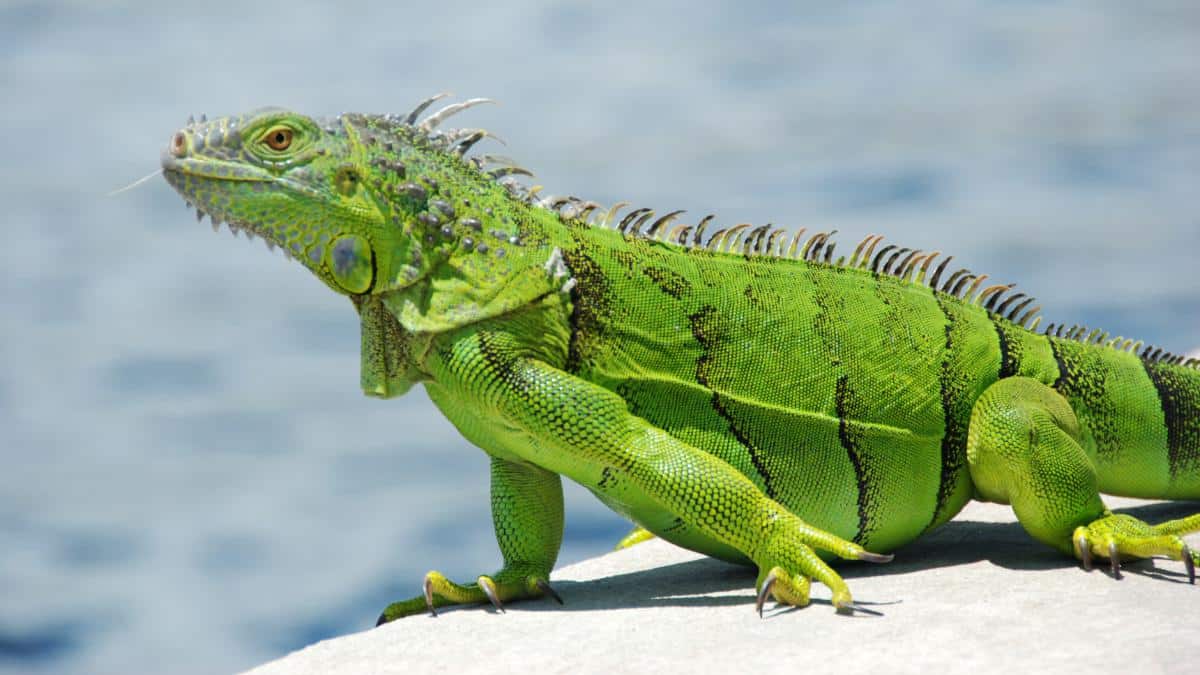

Green iguanas are among the high-risk, non-native species to be banned from Florida's animal trade. Travel_Bug / Getty Images
Despite public resistance, the Florida Fish and Wildlife Conservation Commission voted to ban the possession and breeding of 16 high-risk invasive species.
The new ruling, approved late last month, includes Burmese pythons, Argentine black and white tegus, green iguanas and 13 other high-risk, non-native snakes and lizards which “pose a threat to Florida‘s ecology, economy, and human health and safety,” the FWC wrote in a statement.
So far, environmental groups have celebrated the decision, saying it will help protect Florida’s natural ecosystems, waterways and native species, while exotic pet owners and breeders who benefit from the state’s profitable animal trade have condemned it.
More than 500 non-native species have been reported in Florida, 80 percent of which have been introduced through live animal trades, the FWC wrote. When these same animals are released into the wild, they reproduce and ultimately out-compete native species.
“I’m very sensitive to the people in the pet trade and enthusiasts. But this action is a result of the invasive species that continue to get into the wild,” FWC Commissioner Robert Spottswood said in a statement about the ruling. “We have so many of these species now: pythons, tegus, iguanas. These animals are doing lots of damage and we are incumbent to do something.”
The public hearing lasted four hours and included more than 80 people from across the country, many of whom called in to oppose the rule, The Washington Post reported. Some exotic pet owners expressed concern over losing pets they considered family members.
“If you take them away, “I would be really messed up,” said one caller who owns pythons and iguanas, according to the Washington Post.
The green iguana, first spotted in Florida in 1960 and deemed an “exotic curiosity,” is now considered an environmental threat that carries salmonella, enters sewers and digs up sea walls, The Guardian reported. The FWC is now encouraging locals to humanely kill iguanas found on their property in order to prevent them from causing further ecological damage, The Guardian added.
The ban will not require current owners to get rid of their pets as long as owners meet new compliance rules. It also gives businesses three years to “get rid of their breeding stock,” The Washington Post reported.
Business owner Eugene Bessette, who started his Central Florida python business, Ophiological Services, more than 40 years ago, assumes the ban will result in illegal trade. This will only accelerate the invasive species problem. “If people want something, they’re going to find a way to get it,” Bessette told The Washington Post.
But the ban could also stop less responsible pet owners from releasing non-native reptiles into the state, the Tampa Bay Times editorial board wrote. “While the move feels at least 20 years too late for some of the damaging reptiles like the Burmese python, it’s better than nothing.”
The python, which can grow to be more than 15 feet long, is responsible for wreaking ecological havoc across the Everglades, the editorial board wrote. In a 2012 study, researchers found raccoon populations had dropped 99.3 percent, opossums 98.9 percent and bobcats 87.5 percent since 1997, while marsh rabbits, cottontail rabbits and foxes had disappeared. The wildlife populations that had declined the most were also the ones most commonly found in the stomachs of Burmese pythons that had been removed from Everglades National Park, the USGS reported.
Environmental groups, including the Nature Conservancy, Audubon Florida and the Everglades Coalition, have praised the recent ban for what it could mean for Florida’s communities and iconic ecosystems.
“The Nature Conservancy supports proposed rule changes to address the threat of nonnative species and looks forward to working with the FWC toward solutions that could further protect Florida’s environment, human health and safety, and economy,” said Greg Knecht, the Florida chapter’s deputy director of the Nature Conservancy, according to the FWC.
- Invasive, Dog-Sized Lizards Pose Threat Across Southeastern U.S. ...
- EPA Permit Won't Protect Great Lakes from Invasive Species ...
- Invasive Species Have Led to a Third of Animal Extinctions Since ...
- Are We Managing Invasive Species Wrong?
- Invasive Species Cost Billions of Dollars in Damages Annually, Researchers Find

 233k
233k  41k
41k  Subscribe
Subscribe 